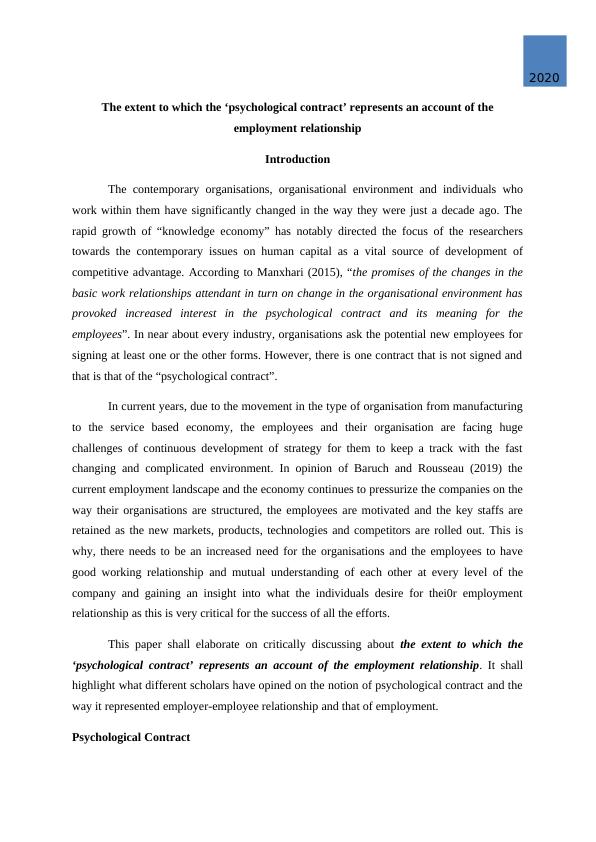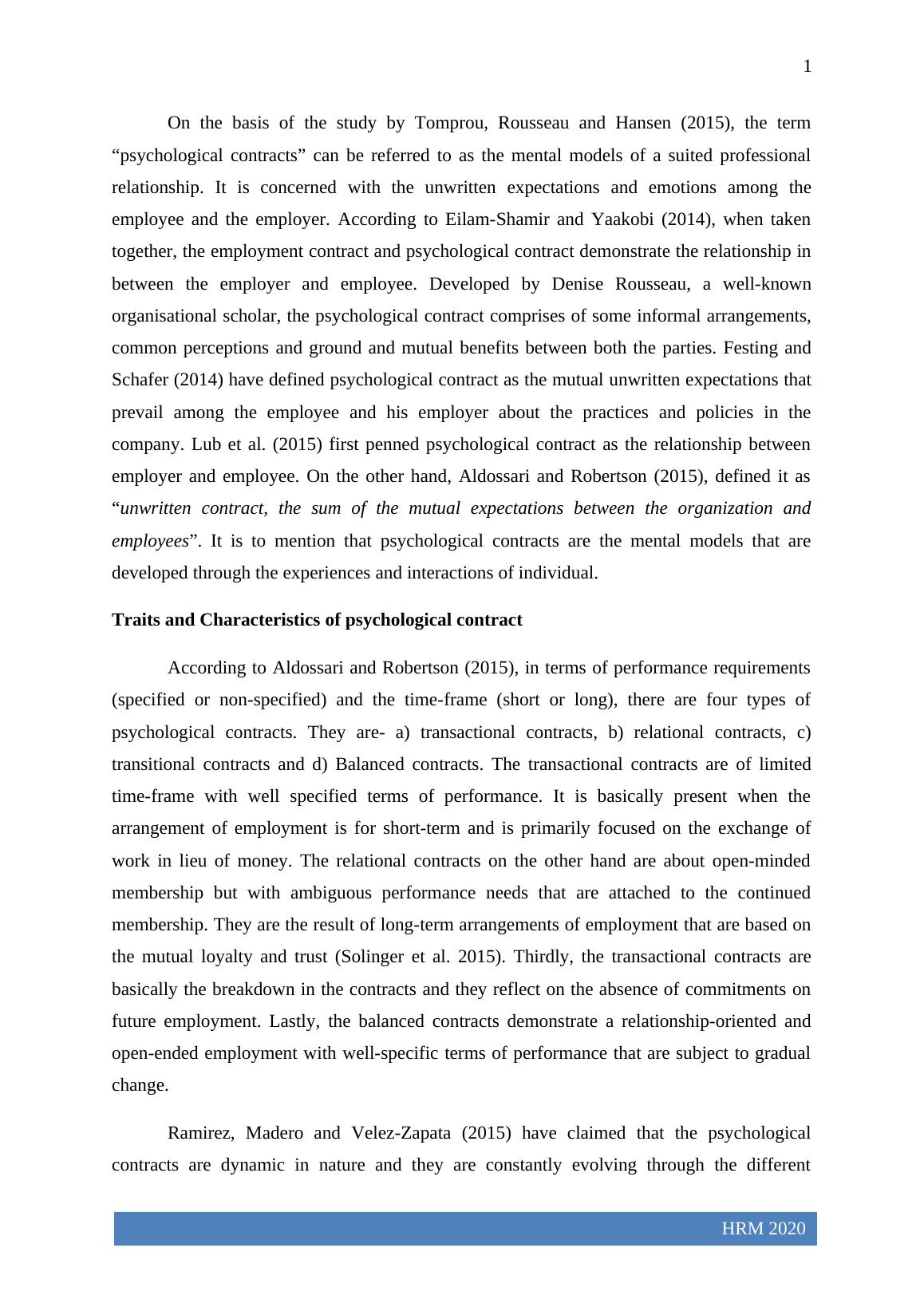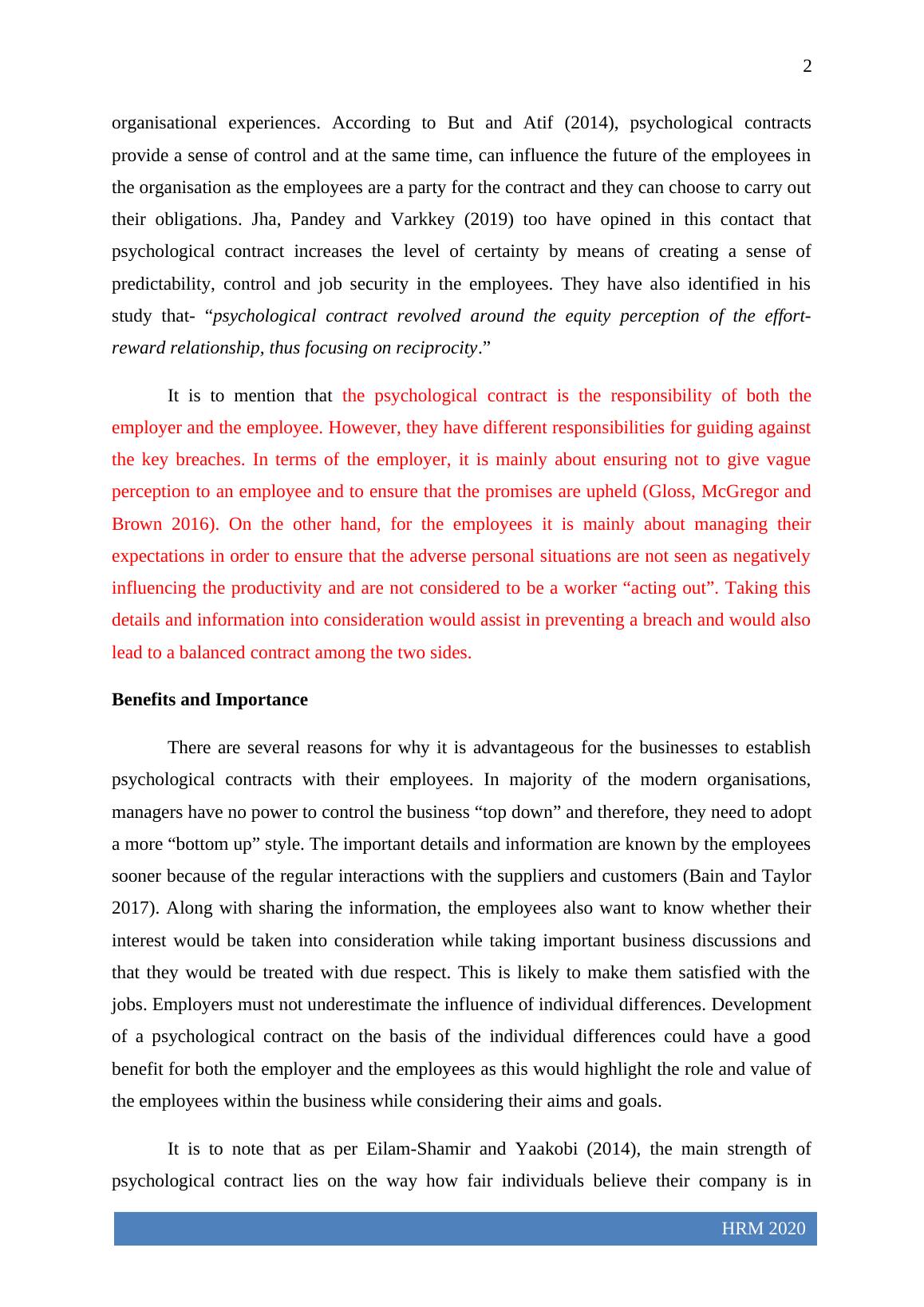Discussion on Psychological Contract
Write an essay critically discussing the extent to which the 'psychological contract' represents an account of the employment relationship.
9 Pages3580 Words18 Views
Added on 2022-08-08
About This Document
Take Option 1
Discussion on Psychological Contract
Write an essay critically discussing the extent to which the 'psychological contract' represents an account of the employment relationship.
Added on 2022-08-08
ShareRelated Documents
The extent to which the ‘psychological contract’ represents an account of the
employment relationship
Introduction
The contemporary organisations, organisational environment and individuals who
work within them have significantly changed in the way they were just a decade ago. The
rapid growth of “knowledge economy” has notably directed the focus of the researchers
towards the contemporary issues on human capital as a vital source of development of
competitive advantage. According to Manxhari (2015), “the promises of the changes in the
basic work relationships attendant in turn on change in the organisational environment has
provoked increased interest in the psychological contract and its meaning for the
employees”. In near about every industry, organisations ask the potential new employees for
signing at least one or the other forms. However, there is one contract that is not signed and
that is that of the “psychological contract”.
In current years, due to the movement in the type of organisation from manufacturing
to the service based economy, the employees and their organisation are facing huge
challenges of continuous development of strategy for them to keep a track with the fast
changing and complicated environment. In opinion of Baruch and Rousseau (2019) the
current employment landscape and the economy continues to pressurize the companies on the
way their organisations are structured, the employees are motivated and the key staffs are
retained as the new markets, products, technologies and competitors are rolled out. This is
why, there needs to be an increased need for the organisations and the employees to have
good working relationship and mutual understanding of each other at every level of the
company and gaining an insight into what the individuals desire for thei0r employment
relationship as this is very critical for the success of all the efforts.
This paper shall elaborate on critically discussing about the extent to which the
‘psychological contract’ represents an account of the employment relationship. It shall
highlight what different scholars have opined on the notion of psychological contract and the
way it represented employer-employee relationship and that of employment.
Psychological Contract
2020
employment relationship
Introduction
The contemporary organisations, organisational environment and individuals who
work within them have significantly changed in the way they were just a decade ago. The
rapid growth of “knowledge economy” has notably directed the focus of the researchers
towards the contemporary issues on human capital as a vital source of development of
competitive advantage. According to Manxhari (2015), “the promises of the changes in the
basic work relationships attendant in turn on change in the organisational environment has
provoked increased interest in the psychological contract and its meaning for the
employees”. In near about every industry, organisations ask the potential new employees for
signing at least one or the other forms. However, there is one contract that is not signed and
that is that of the “psychological contract”.
In current years, due to the movement in the type of organisation from manufacturing
to the service based economy, the employees and their organisation are facing huge
challenges of continuous development of strategy for them to keep a track with the fast
changing and complicated environment. In opinion of Baruch and Rousseau (2019) the
current employment landscape and the economy continues to pressurize the companies on the
way their organisations are structured, the employees are motivated and the key staffs are
retained as the new markets, products, technologies and competitors are rolled out. This is
why, there needs to be an increased need for the organisations and the employees to have
good working relationship and mutual understanding of each other at every level of the
company and gaining an insight into what the individuals desire for thei0r employment
relationship as this is very critical for the success of all the efforts.
This paper shall elaborate on critically discussing about the extent to which the
‘psychological contract’ represents an account of the employment relationship. It shall
highlight what different scholars have opined on the notion of psychological contract and the
way it represented employer-employee relationship and that of employment.
Psychological Contract
2020

HRM 2020
1
On the basis of the study by Tomprou, Rousseau and Hansen (2015), the term
“psychological contracts” can be referred to as the mental models of a suited professional
relationship. It is concerned with the unwritten expectations and emotions among the
employee and the employer. According to Eilam-Shamir and Yaakobi (2014), when taken
together, the employment contract and psychological contract demonstrate the relationship in
between the employer and employee. Developed by Denise Rousseau, a well-known
organisational scholar, the psychological contract comprises of some informal arrangements,
common perceptions and ground and mutual benefits between both the parties. Festing and
Schafer (2014) have defined psychological contract as the mutual unwritten expectations that
prevail among the employee and his employer about the practices and policies in the
company. Lub et al. (2015) first penned psychological contract as the relationship between
employer and employee. On the other hand, Aldossari and Robertson (2015), defined it as
“unwritten contract, the sum of the mutual expectations between the organization and
employees”. It is to mention that psychological contracts are the mental models that are
developed through the experiences and interactions of individual.
Traits and Characteristics of psychological contract
According to Aldossari and Robertson (2015), in terms of performance requirements
(specified or non-specified) and the time-frame (short or long), there are four types of
psychological contracts. They are- a) transactional contracts, b) relational contracts, c)
transitional contracts and d) Balanced contracts. The transactional contracts are of limited
time-frame with well specified terms of performance. It is basically present when the
arrangement of employment is for short-term and is primarily focused on the exchange of
work in lieu of money. The relational contracts on the other hand are about open-minded
membership but with ambiguous performance needs that are attached to the continued
membership. They are the result of long-term arrangements of employment that are based on
the mutual loyalty and trust (Solinger et al. 2015). Thirdly, the transactional contracts are
basically the breakdown in the contracts and they reflect on the absence of commitments on
future employment. Lastly, the balanced contracts demonstrate a relationship-oriented and
open-ended employment with well-specific terms of performance that are subject to gradual
change.
Ramirez, Madero and Velez-Zapata (2015) have claimed that the psychological
contracts are dynamic in nature and they are constantly evolving through the different
1
On the basis of the study by Tomprou, Rousseau and Hansen (2015), the term
“psychological contracts” can be referred to as the mental models of a suited professional
relationship. It is concerned with the unwritten expectations and emotions among the
employee and the employer. According to Eilam-Shamir and Yaakobi (2014), when taken
together, the employment contract and psychological contract demonstrate the relationship in
between the employer and employee. Developed by Denise Rousseau, a well-known
organisational scholar, the psychological contract comprises of some informal arrangements,
common perceptions and ground and mutual benefits between both the parties. Festing and
Schafer (2014) have defined psychological contract as the mutual unwritten expectations that
prevail among the employee and his employer about the practices and policies in the
company. Lub et al. (2015) first penned psychological contract as the relationship between
employer and employee. On the other hand, Aldossari and Robertson (2015), defined it as
“unwritten contract, the sum of the mutual expectations between the organization and
employees”. It is to mention that psychological contracts are the mental models that are
developed through the experiences and interactions of individual.
Traits and Characteristics of psychological contract
According to Aldossari and Robertson (2015), in terms of performance requirements
(specified or non-specified) and the time-frame (short or long), there are four types of
psychological contracts. They are- a) transactional contracts, b) relational contracts, c)
transitional contracts and d) Balanced contracts. The transactional contracts are of limited
time-frame with well specified terms of performance. It is basically present when the
arrangement of employment is for short-term and is primarily focused on the exchange of
work in lieu of money. The relational contracts on the other hand are about open-minded
membership but with ambiguous performance needs that are attached to the continued
membership. They are the result of long-term arrangements of employment that are based on
the mutual loyalty and trust (Solinger et al. 2015). Thirdly, the transactional contracts are
basically the breakdown in the contracts and they reflect on the absence of commitments on
future employment. Lastly, the balanced contracts demonstrate a relationship-oriented and
open-ended employment with well-specific terms of performance that are subject to gradual
change.
Ramirez, Madero and Velez-Zapata (2015) have claimed that the psychological
contracts are dynamic in nature and they are constantly evolving through the different

HRM 2020
2
organisational experiences. According to But and Atif (2014), psychological contracts
provide a sense of control and at the same time, can influence the future of the employees in
the organisation as the employees are a party for the contract and they can choose to carry out
their obligations. Jha, Pandey and Varkkey (2019) too have opined in this contact that
psychological contract increases the level of certainty by means of creating a sense of
predictability, control and job security in the employees. They have also identified in his
study that- “psychological contract revolved around the equity perception of the effort-
reward relationship, thus focusing on reciprocity.”
It is to mention that the psychological contract is the responsibility of both the
employer and the employee. However, they have different responsibilities for guiding against
the key breaches. In terms of the employer, it is mainly about ensuring not to give vague
perception to an employee and to ensure that the promises are upheld (Gloss, McGregor and
Brown 2016). On the other hand, for the employees it is mainly about managing their
expectations in order to ensure that the adverse personal situations are not seen as negatively
influencing the productivity and are not considered to be a worker “acting out”. Taking this
details and information into consideration would assist in preventing a breach and would also
lead to a balanced contract among the two sides.
Benefits and Importance
There are several reasons for why it is advantageous for the businesses to establish
psychological contracts with their employees. In majority of the modern organisations,
managers have no power to control the business “top down” and therefore, they need to adopt
a more “bottom up” style. The important details and information are known by the employees
sooner because of the regular interactions with the suppliers and customers (Bain and Taylor
2017). Along with sharing the information, the employees also want to know whether their
interest would be taken into consideration while taking important business discussions and
that they would be treated with due respect. This is likely to make them satisfied with the
jobs. Employers must not underestimate the influence of individual differences. Development
of a psychological contract on the basis of the individual differences could have a good
benefit for both the employer and the employees as this would highlight the role and value of
the employees within the business while considering their aims and goals.
It is to note that as per Eilam-Shamir and Yaakobi (2014), the main strength of
psychological contract lies on the way how fair individuals believe their company is in
2
organisational experiences. According to But and Atif (2014), psychological contracts
provide a sense of control and at the same time, can influence the future of the employees in
the organisation as the employees are a party for the contract and they can choose to carry out
their obligations. Jha, Pandey and Varkkey (2019) too have opined in this contact that
psychological contract increases the level of certainty by means of creating a sense of
predictability, control and job security in the employees. They have also identified in his
study that- “psychological contract revolved around the equity perception of the effort-
reward relationship, thus focusing on reciprocity.”
It is to mention that the psychological contract is the responsibility of both the
employer and the employee. However, they have different responsibilities for guiding against
the key breaches. In terms of the employer, it is mainly about ensuring not to give vague
perception to an employee and to ensure that the promises are upheld (Gloss, McGregor and
Brown 2016). On the other hand, for the employees it is mainly about managing their
expectations in order to ensure that the adverse personal situations are not seen as negatively
influencing the productivity and are not considered to be a worker “acting out”. Taking this
details and information into consideration would assist in preventing a breach and would also
lead to a balanced contract among the two sides.
Benefits and Importance
There are several reasons for why it is advantageous for the businesses to establish
psychological contracts with their employees. In majority of the modern organisations,
managers have no power to control the business “top down” and therefore, they need to adopt
a more “bottom up” style. The important details and information are known by the employees
sooner because of the regular interactions with the suppliers and customers (Bain and Taylor
2017). Along with sharing the information, the employees also want to know whether their
interest would be taken into consideration while taking important business discussions and
that they would be treated with due respect. This is likely to make them satisfied with the
jobs. Employers must not underestimate the influence of individual differences. Development
of a psychological contract on the basis of the individual differences could have a good
benefit for both the employer and the employees as this would highlight the role and value of
the employees within the business while considering their aims and goals.
It is to note that as per Eilam-Shamir and Yaakobi (2014), the main strength of
psychological contract lies on the way how fair individuals believe their company is in

End of preview
Want to access all the pages? Upload your documents or become a member.
Related Documents
Understanding Psychological Contractlg...
|7
|1959
|433
Psychological Contract Breach and Its Implications on Employee Attitude and Behavioural Job Outcomeslg...
|8
|2268
|469
Introduction to Human Resource Management & Learning and Talent Development Assessment 2020lg...
|8
|2145
|37
The Role of Psychological Contract in Employee-Employer Relationshiplg...
|10
|2584
|91
Leading and Managing People: Literature Review and Recommendationslg...
|11
|1970
|357
Flexible Working & the Psychological Contract Report 2022lg...
|8
|2004
|49
